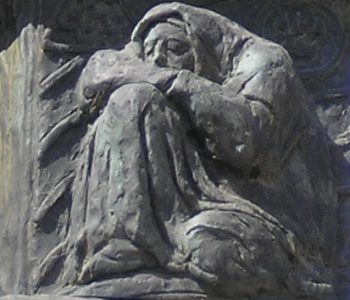“My goal is to understand a little corner of God’s plan.”
-Henry “Fritz” Schaefer

Deror Avi
The Book of Job is one of my favorites of the Old Testament and a literary masterpiece that is unlike any other book of the Bible. It reads like a Greek tragedy and is full of poetic imagery as it strives to answer the age-old question, “Why do bad things happen to good people?” It is the story of a wealthy, benevolent landowner who becomes the central character in a strange wager between the Creator of all things visible and invisible and His archenemy Satan.
The crux of the bet is whether or not a person’s faith will falter if they are subjected to enough misery in their lives. God is convinced that his loyal, devoted servant Job will never succumb to the pressure, but encourages Satan to do his best – provided he doesn’t kill the man in the bargain. (Personal note: I don’t enjoy the image of God gambling with the devil over humanity like it’s a football game, but I’m throwing this one up to the author’s literary license and not a report of actual events.)
Over the next few verses, Satan strikes and Job loses everything yet, throughout it all, he never turns his back on God. Even when his three friends arrive and tell him to examine his conscience to determine what he did to incur the wrath of God, Job cannot find one solid reason to account for this level of suffering. At some point the “why” of it all begins to bother him and in dramatic fashion, Job calls God out on the subject. He alleges God has made a terrible mistake and wants Him to explain Himself.
In a stunning move, God does just that, but his answers do little to satisfy the one who is asking the question, nor the readers who will turn to this story in search of meaning when their own lives seem to be spiraling out of control. The moral of the story lies in today’s reading when Job acknowledges that there are things out there that we simply do not understand and that even if we had the answer, we couldn’t comprehend it.
We should not be ashamed of not having all of the answers, but it’s human to crave the hard evidence we may not get in this lifetime. We tell ourselves that if our conviction is strong enough, then we don’t need proof…but sometimes, when new facts are illuminated – even if we don’t understand them – it helps us in our overarching belief.
That’s when faith matters the most: When we question and come up empty. When we go down the different paths only to find dead ends. When we receive the answer we are looking for, but it’s not the one we want or expect. It’s all that we have left when we feel like we’ve done everything right, but seem to be on the losing end of a bad bet.
Today’s readings for Mass: JB 42:1-3, 5-6, 12-17; PS 119: 66, 71, 75, 91, 125, 130; LK 10:17-24
